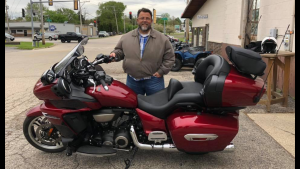Am I My Brother’s Keeper?
By Chaplain Darrin Salzman, LCSW, BCPCC

When asked about my personal philosophy for chaplaincy, I am reminded of Cain’s question to God in Genesis 4:9. Cain had just murdered his brother and God was asking him about it. Cain attempted to deflect responsibility for his action with a question, “Am I my brother’s keeper?” God answered the question of course, but never more definitively than in Mark 12:31 when Jesus stated “…You shall love your neighbor as yourself.” This commandment was Jesus’ summation of six of the ten commandments that addressed how people should interact with one another (i.e. brothers and neighbors). Jesus’ summation was powerful, and his audience knew it. Mark goes on to say in verse 34 that after Jesus had made this answer no one dared to question him. Jesus’ answer was a gamechanger. His commandment focused with laser precision on the spirit and intent of the last six commandments of the Decalogue. Jesus’s answer did not leave room for minimum standards of behavior. It calls us out to be our very best. What is more, Jesus defined the term ‘neighbor’ in the parable of the Good Samaritan in Luke 10:25-37. In this parable Jesus identified their neighbor as a Samaritan! It would not have been a big deal if Jesus had identified their neighbor as a Judean. Judeans were people like them. They liked Judeans. They did not like Samaritans. The takeaway is Jesus has commanded us to love people we do not normally like, let alone love as ourselves.
As a lay chaplain engaged in street ministry, we operate outside of church buildings, away from safe zones. People can be complicated and messy. They make no pretense of living by any Christian standard. It is a missional type of ministry. We engage with bikers, prisoners, addicts, and those engaged in the sex trade. In short, we engage with people oftentimes marginalized or otherwise on the fringes of ‘Judean’ society. We engage with our culture’s Samaritans! We are called to love them as ourselves. The first century church provides a great model on how to do this. The first century church did not operate from a base of power, wealth, or prestige. Quite the opposite. It was severely persecuted and culturally marginalized. The Roman government was actively trying to stamp it out of existence. The one thing Christians had was love. It was what defined them. Jesus predicted this quite accurately in John 13:35 when he said, “By this all will know that you are My disciples, if you have love for one another.” The first century church took in the destitute. It fed the starving. It housed the homeless, widows, and orphans. It visited those in prisons and hospitals. There really is no higher form of ministry. In Matthew 25:35-40 Jesus himself said when we do these things it is the same as if we do them for him. It is said people do not care how much you know until they know how much you care. The first century people experienced how much the Christian church cared, and as a result they wanted to know more about Jesus.
As a modern day lay chaplain in street ministry, our ministry is one of presence. It is one of patient intentionality. We must always be ready for a divine appointment. Our goal is to be present when needed. We build relationships with non-believers so we are there if they experience a crisis of life. We listen to people. There are so many people in the world who suffer alone and in isolation. By listening to the narrative of their life’s story, we can make them feel heard. Moving forward, we can explore with them through pastoral counseling how God can fit into the story that is yet to be written. It is important that our faith is built on a solid foundation, apologetically speaking. We must be spiritually prepared. There will be many who are offended by the mere fact we are Christian. They will challenge our faith in a God who to them does not seem good because of all the pain and suffering in the world. The reality is that so much of the pain and suffering in the world is caused by people. It is equally true that people, created in the image of God, can relieve much of that pain and suffering with our God-given abilities. If collectively we would only live by Jesus’ command in Mark 12:31 to love our neighbor as our self, the world would be a much better place. What is my personal philosophy of ministry as a chaplain? I am my brother’s keeper!

